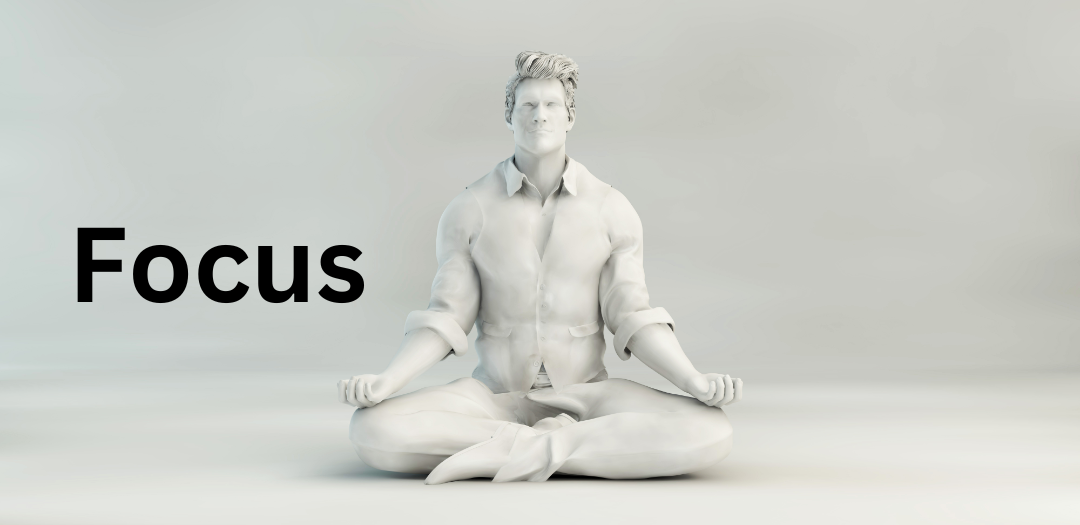With the amount of technology we have at our fingertips these days, it feels like we should be able to accomplish more than ever.
So why does it feel like we’re getting nothing done?
There are a few reasons.
First, as our capacity to do more has increased, so have the expectations. We are expected to do more with less, so rather than getting accolades for doing more in less time, our only reward is more work. Not exactly motivating.
Second, while technology can be used to make us more productive, its default setting is to distract us.
How often have you been in the middle of something when you got a notification on your phone?
You stop to read the notification, then respond to it, then look something up, then you’re down the rabbit hole and you’ve completely forgotten what you were doing before your phone went off.
That’s why my first tip if you’re having trouble focusing is to:
Put Your Phone Away
At a minimum, you should turn off notifications on your phone. Put it on Do Not Disturb so it won’t go off until you’re done with your project.
If you’re worried about loved ones not being able to get hold of you in an emergency, you can set your phone so only certain people can call through the DND setting.
If you know you have a tendency to pick up your phone to look stuff up when you think of something, you might want to go the extra step of putting your phone in a drawer so it’s out of sight and out of mind until you’re done.
If you think of something important that’s not related to the project you’re working on, write it down so you don’t forget it, then get back to work on your project. That thing you remembered will still be there the next time you look at the note you left for yourself.
The same goes for your email. Shut off email alerts when you’re working on something you know needs your full attention. Either avoid having your email open when you’re working on something, or if you need to have it open, make sure it’s in another window so you can’t see the number of unopened emails in your inbox while you’re working on your project. That way you won’t be tempted to check your email every time you see that number go up.
Depending on what you’re working on, you can also have the software or browser you’re using set to take up the entire screen so it’s all you see while you’re working. It’s a great way to eliminate distractions.
And, this should go without saying, but definitely stay off social media. You can even use browser extensions that block social media sites for a certain amount of time or for certain hours each day to make sure you’re focused when you need to be working, but you can still access social media on your time off.
Make a List the Night Before of What Needs to Get Done the Next Day
Making a to-do list for the next day before you go to bed is incredibly powerful. First, it’s easier to get to sleep because you’ve written down everything you’re going to do the next day so you don’t have to lie in bed running through your to-do list in your head. Writing it down means it’s taken care of for the night, so you can focus on getting some sleep.
It also enables you to get up in the morning and tackle the day with a sense of purpose.
Not getting clear on what needs to be done opens you up for distraction. When you haven’t committed yourself to one course of action, you’re much more likely to go after whatever’s right in front of you at the moment, which may or may not be what you need to focus on to achieve your goals.
Figure out what needs to be done, make a list, and make that list your priority.
Put In Your Calendar What Times You’ll Work on What Tasks
It’s easy to say, “I’ll work on this tomorrow,” without really thinking about how much time it’s going to take, or when you’ll make the time in your schedule tomorrow to work on it.
So, instead of being vague about what you want to accomplish in a given day, week, month, or year, plan it down to the hour.
Which hours will you spend on which projects?
Block out time in your calendar to work on everything you want to devote time to, and treat that commitment with all the importance and inflexibility of a client meeting.
You are making this commitment to yourself, and it is nonnegotiable.
Use the Pomodoro Method
If you’re not familiar with the Pomodoro Method, it’s a great way to trick yourself into getting and staying focused.
The idea is you have 25 minutes to work on something, then you get a five-minute break to check your email, get a snack, get up and stretch, whatever you need to do. Then the clock starts again.
Because you know you’ll get a break in 25 minutes, it’s much easier to stay focused for that short amount of time than if you give yourself two hours to work on something.
Two hours can feel like a really long time. When you feel like you have all the time in the world, you’re less likely to put your nose to the grindstone and hustle it out.
If you’ve ever put off studying for a test, you’ve experienced this phenomenon.
You have weeks to study, so you don’t even crack open a book.
Then you have days to study, and you might look at your notes now and then.
Then it’s the night before the big test and suddenly you’re trying to cram everything you’ve learned over the past semester into your head.
That’s because there was no sense of urgency to study for the test when it was scheduled a week, or even a month ago. It’s not until the test is looming over your head that studying suddenly seems urgent.
The Pomodoro Method creates that sense of urgency so you can use it to your advantage.
Take a Break
If you’ve been staring at blank computer screen, or page, or whatever your material of choice is, for more than a few minutes and still nothing is coming to you, sometimes it’s best to step away.
Weather permitting, going for a walk outdoors is one of the best ways to get your blood flowing again. When you move your body, the increased blood flow doesn’t just carry more oxygen to your muscles – it also carries more oxygen to your brain, enabling you to come up with new solutions to old problems.
And sometimes it’s hard to focus when we try to force it, so just the act of getting up and leaving the project for a few minutes can help our brains to adjust and start seeing the problem in a new light, which enables us to see solutions we hadn’t thought of before.
For more tips like this, join my Alpha 5 Community. I share all my secrets for success, and you get to share your journey to success with other likeminded go-getters, while cheering them along on their journeys to success.
Having a community is one of the most powerful secrets to success, but it can also be hard to find, which is why I created the Alpha 5 Community. You can check it out here.

